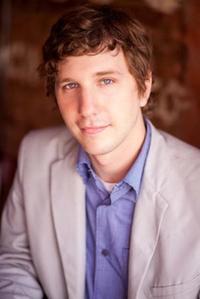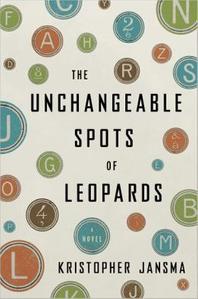 The narrator of The Unchangeable Spots of Leopards may claim authorship of his own story, but he owes his beguiling spiel of half truths, doppelgänger characters and slanted biography to first-time novelist Kristopher Jansma. A graduate of the Writing Seminars at Johns Hopkins University and Columbia University's M.F.A. Writing Program in Fiction, and currently a lecturer at Manhattanville College and SUNY-Purchase, Jansma plays with narrative expectations and ventures far off-campus in his ingenious debut (see our review below). In addition to virtual air miles, the book has calories to spare: one Penguin sales rep vowed to eat her advance copy of The Unchangeable Spots of Leopards if it didn't make the Indie Next List of bookseller-endorsed handsells. (Update: April's list is expected to save Wendy Pearl from actually eating Jansma's words.) In our interview, Jansma tells that he leapt from writing short stories to constructing a big-game novel any narrator would be proud to claim, if not chew.
The narrator of The Unchangeable Spots of Leopards may claim authorship of his own story, but he owes his beguiling spiel of half truths, doppelgänger characters and slanted biography to first-time novelist Kristopher Jansma. A graduate of the Writing Seminars at Johns Hopkins University and Columbia University's M.F.A. Writing Program in Fiction, and currently a lecturer at Manhattanville College and SUNY-Purchase, Jansma plays with narrative expectations and ventures far off-campus in his ingenious debut (see our review below). In addition to virtual air miles, the book has calories to spare: one Penguin sales rep vowed to eat her advance copy of The Unchangeable Spots of Leopards if it didn't make the Indie Next List of bookseller-endorsed handsells. (Update: April's list is expected to save Wendy Pearl from actually eating Jansma's words.) In our interview, Jansma tells that he leapt from writing short stories to constructing a big-game novel any narrator would be proud to claim, if not chew.
The 10 chapters in The Unchangeable Spots of Leopards replicate and enlarge the themes established in the initial "Author's Note": travel, storytelling, love, loss, time's passage and escape. Did you plan the novel's fractal structure from the outset?
I wish I could say that I had it all planned out from the first step, but in fact it happened the other way around. I wrote each chapter separately over the course of a year-long story writing project. Julian and Evelyn just kept coming back to me, in odd ways, and so I'd write a little more about them and a little more. Finally I had all these fragments I wanted to put together, but I didn't quite see how to assemble them. It was only then that I came across the idea of the "Author's Note" in the beginning that could frame the chapters and introduce the themes that are at play in the rest of the book.
What (if any) organizational tools did you use to keep all the interlocking details and characters consistent?
I scribble down a lot of notes, but I have to confess they're often so disorganized that they're of little use to me later. Mostly it came down to keeping it all in my head at the same time. The novel was so intricately constructed by the end that, as my editor and I worked on it, I had to be very careful. Changing one detail in chapter 8 might involve going back and adjusting details in chapters 2, 10 and 4. But with the help of many friends and early readers, I was able to maintain that consistency.
How did you choose the exotic destinations in your novel: the Arab Emirates, Sri Lanka, Ghana, Iceland and Luxembourg? For the places you might not have visited, how did you create their verisimilitude?
From the beginning, I wanted the reader to really be taken on a journey, but of course I couldn't afford to actually go to all those places myself. Writers are often told to write what they know, but I really like to write what I want to know. So I did a lot of research and tried to describe them until they felt real to me. Dubai was just a place I'd read about in a George Saunders essay. I ran across an article about the Tamil people in Sri Lanka in an issue of the New Yorker--that sort of thing. But then later on, I talked to friends and family who had traveled to these places and was able to get them to help me check my facts and translations. I did actually go to the Grand Canyon with my family, and to Ghana with my in-laws, who taught one semester in Kumasi, but in both cases I'd already written the chapters based on my research... and so I wound up just mainly checking my facts while I was there. After I sold the book, my wife and I took a trip to Paris to celebrate, and we took a day-trip by train to Luxembourg... but, again, I'd already written the whole chapter before arriving.
Why, in a book where most of the main characters appear under two names, did you keep the reader ignorant of the narrator's name?
Unnamed narrators have always been a special favorite of mine in literature. There's something about listening to someone confess all these emotions and crimes and hopes to you, when in the back of your mind, you know they've withheld the most basic and intimate detail about themselves. There's an unnamed narrator in Henry James's novella The Aspern Papers that I particularly love. He makes up a fake name to seduce a young woman who might help him get access to some letters belonging to a poet he's obsessed with, but he doesn't even tell the reader what the fake name is. Then there's a scene where he breaks down and confesses his real name to the woman, but he still doesn't tell us what it is! As a reader you just feel so betrayed! How could he tell her and not me? Any book that can get you to react that way to an imaginary person is doing its job perfectly.
Please elucidate the metafictional distinction between "lies" and "fictions" in this sentence from the "Author's Note": "Yet I feel certain that somewhere in this empty space, between my lies and my fictions, is the truth."
Certainly. In a way, that's something I hope the book itself defines by the end. A lie is something untrue which leads someone farther from the truth. Fiction is also something untrue, but which leads you closer to the truth. The narrator doesn't understand the distinction throughout most of the novel, and believes that being a gifted liar is essential to being a gifted fiction writer. Yes, a fiction writer, like a liar, must be able to fabricate something so skillfully that the reader finds it believable, but the liar wants only to fool the reader, and maybe him or herself. The fiction writer wants to enlighten the reader, and maybe him or herself as well.
When you write, do you find the Internet to be a biddable muse, an efficient research assistant or a wicked temptress?
I have a very hard time writing when I can't use the Internet to help me with research. I love finishing a story and then looking back at the tabs I've had open: a history of Washington Square, a summary of The Cherry Orchard, effects of coumarin, map of the Crimean peninsula, lyrics to Fiddler on the Roof...etc., etc. If it seems totally random at the end of the day, then I feel really good about the ride the reader is going to go on. But there is the dark side of the Internet as well. When I get stuck on a moment in a story, it's not uncommon that I'll look up, three hours later, having read half the New York Times Opinion section, Googled myself 10 times, read 300 tweets, looked at friends' baby pictures on Facebook, etc., etc. In the end, if I'm more interested in all that than I am by what I'm writing, that's sometimes a sign that I need to back up a few steps.

I don't know that I can separate them, to be honest. They're all so tightly connected in my mind at this point. The philosophical explorations of the nature of honesty and lies would be a little dry without the rivalry and the love story, and those things might be a little too melodramatic without the travel and the ideas about fiction they're built on. I think that at the end of the day they all have to matter equally, or none of it does.
Do you believe that people can change their spots even if leopards cannot?
I absolutely believe that people do have the ability to change their spots, though I think it happens rarely--maybe only a few times in one person's life, if that often. It's not as simple as picking up better eating habits or working out more or buying a new wardrobe... it's about fundamentally reevaluating yourself and your assumptions and your views. A lot of people would say it's just not possible, but I do think it is. What is literature anyway, if not a long, long history of people trying to change their lives? Sometimes a story might end with just the smallest glimmer of a hope that a change might occur. But that's huge.
Finally, The Unchangeable Spots of Leopards features one of the brashest unreliable narrators in recent contemporary fiction. Are you an equally unreliable author interviewee, or can we believe some of the answers you've given above?
Thank you very much! I myself am a terrible liar.... I never manage to pull the wool over people's eyes. That's one of the reasons that the narrator was so much fun to write. It was great to inhabit someone else for a while who could do all the things I couldn't get away with in real life. I can lie when I'm writing fiction, because there's no guilt about misleading people, no fear of getting caught. The reader knows it's all made-up, and wants it to be so beautifully made-up that they begin to believe it... and there's nothing I enjoy more than that. --Holloway McCandless, blogger at Litagogo: A Guide to Free Literary Podcasts

